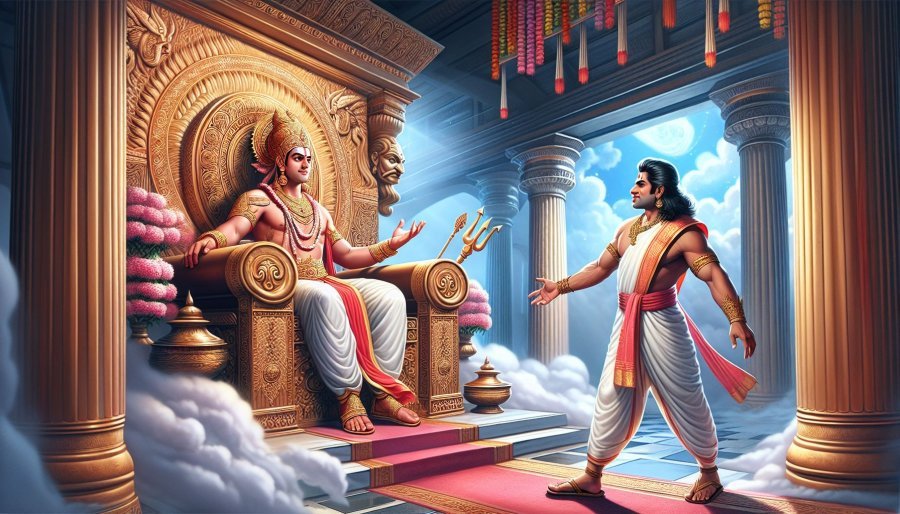Section XLVII [summary]
Book index: Mahabharata (English)
This page contains a summary of the Mahabharata Section XLVII including examples of moral lessons in daily life. The Maha-Bharata is one of the largest epics ever written containing roughly 100,000 Sanskrit verses. It deals with the legendary history of ancient India and contains a large number of interwoven tales.

Short summary of the chapter:
The great Rishi Lomasa visited the abode of Indra and saw Arjuna seated on Indra's seat, wondering how a Kshatriya had attained such a high position. Indra then revealed to Lomasa that Arjuna was his son born of Kunti and had come to acquire weapons for a specific purpose. He also explained that Arjuna was actually the ancient Rishi Narayana incarnated on earth for a virtuous reason, along with Nara who was known as Hrishikesa. Indra requested Lomasa to tell Yudhishthira not to worry about Arjuna's absence as he would return with mastery over weapons and other skills.
Indra revealed to Lomasa that Arjuna was capable of defeating the mighty Asuras known as the Nivatakavacas who threatened the gods' safety, along with Vishnu who could also accomplish this task. He advised Lomasa to reassure Yudhishthira about Arjuna's well-being and instructed them to bathe in sacred waters to cleanse their sins and enjoy their kingdom peacefully. Indra also requested Lomasa to protect Yudhishthira during his travels on earth, warning him of the dangers posed by Rakshasas living in mountainous regions.
Following Indra's instructions, Lomasa set out for the earth to meet Yudhishthira in the woods of Kamyaka, where he found the king surrounded by ascetics and his younger brothers. Arjuna had left to acquire weapons and skills essential for the upcoming battles against formidable foes like Bhishma and Drona. Lomasa conveyed Indra's message to Yudhishthira, assuring him of Arjuna's safety and advising him to visit sacred shrines to cleanse their sins and protect themselves from Rakshasas. Yudhishthira was urged to continue his pilgrimage with his brothers and receive blessings from Brahmanas along the way.
With Indra's guidance and Lomasa's assistance, Yudhishthira continued his pilgrimage, knowing that Arjuna would return with enhanced skills to face their enemies. The brothers embarked on a journey to various sacred shrines, giving to Brahmanas in charity and seeking purification from their sins. Lomasa remained by Yudhishthira's side, protecting him from any dangers that they might encounter during their travels through forests and mountainous terrains, as advised by Indra.
Full English translation:
This page is merely a summary which is automatically generated. If you are looking for authentic sources such as the Sanskrit text or the Full English translation of Mahabharata Section XLVII, have a look at the following articles:
Section XLVII, online text
English translation by Kisari Mohan Ganguli.
Read this and other chapters online.
Mahabharata (English Summary)
by Kisari Mohan Ganguli | ISBN-10: 8121505933
Buy the latest edition:
FAQ of Section XLVII:
Who is the ancient Rishi Lomasa and what did he do?
Lomasa is a great Brahmarshi who visited Indra's abode and was tasked with protecting Yudhishthira during his pilgrimage on earth.
What is the significance of Arjuna sitting on Indra's seat?
Arjuna is no ordinary mortal; he is actually the son of Kunti and a reincarnation of the ancient Rishis Nara and Narayana, born on earth to acquire virtue.
Why did Sakra ask Lomasa to protect Yudhishthira?
Sakra wanted Lomasa to guide Yudhishthira on his pilgrimage, ensuring his safety from Rakshasas and helping him cleanse his sins through visits to sacred shrines.
Mahabharata Section XLVII in daily life:
The story shared embodies profound lessons that can be seamlessly integrated into our everyday lives, teaching us about humility, perseverance, and the continuous quest for personal improvement. It narrates how Arjuna, despite being a mortal and a warrior, earned a revered spot in the celestial abode through his hard work, dedication, and humility. This narrative teaches us, firstly, about the importance of persistence in achieving our goals. Just like Arjuna, who embarked on a quest to acquire celestial weapons and wisdom, we too should persistently pursue our personal and professional goals with determination.
Moreover, the tale emphasizes the significance of humility. Regardless of his achievements and the accolades, Arjuna received, he remained humble, a trait that allowed him to be seated alongside celestial beings. This teaches us that no matter our successes, keeping our feet grounded allows us to be respected and admired by those around us.
The story also highlights the value of mentorship and the role of guidance in achieving greatness. Much like Lomasa and Indra guided and supported Arjuna, seeking out mentors and heeding their advice can be instrumental in our journey towards success.
Lastly, it pushes the narrative that no challenge is too great when faced with courage and the right resources. It inspires us to confront our own battles with confidence, knowing that we can overcome them with persistence, guidance, and humility. Therefore, the lessons drawn from Arjuna’s experience encourage us to keep striving for improvement, maintain our humility, seek guidance, and face our challenges head-on.
